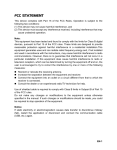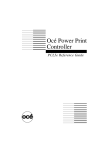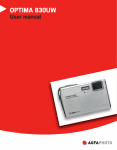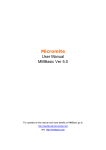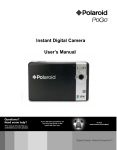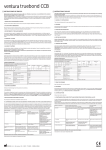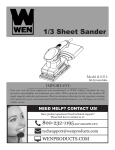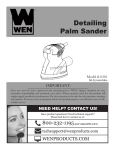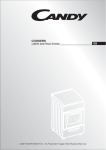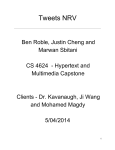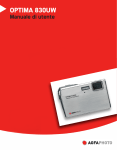Download Polaroid t833 User's Manual
Transcript
FCC STATEMENT This device complies with Part 15 of the FCC Rules. Operation is subject to the following two conditions: (1) This device may not cause harmful interference, and (2) This device must accept any interference received, including interference that may cause undesired operation. Note: This equipment has been tested and found to comply with the limits for Class B digital devices, pursuant to Part 15 of the FCC rules. These limits are designed to provide reasonable protection against harmful interference in a residential installation.This equipment generates uses and can radiate radio frequency energy and, if not installed and used in accordance with the instructions, may cause harmful interference to radio communications. However, there is no guarantee that interference will not occur in a particular installation. If this equipment does cause harmful interference to radio or television reception, which can be determined by turning the equipment off and on, the user is encouraged to try to correct the interference by one or more of the following measures: Reorient or relocate the receiving antenna. Increase the separation between the equipment and receiver. Connect the equipment into an outlet on a circuit different from that to which the receiver is connected. Consult the dealer or an experienced radio/TV technician for help. Use of shielded cable is required to comply with Class B limits in Subpart B of Part 15 of the FCC rules. Do not make any changes or modifications to the equipment unless otherwise specified in the manual. If such changes or modifications should be made, you could be required to stop operation of the equipment. Notice If static electricity or electromagnetism causes data transfer to discontinue midway (fail), restart the application or disconnect and connect the communication cable (USB, etc.) again. ©2008 by All rights reserved. “Polaroid” and “Polaroid and Pixel” are trademarks of Polaroid Corporation. Changes are periodically made to this document. Changes, technical inaccuracies, and Typographic errors will be corrected in subsequent editions. For service, support and warranty information, visit www.polaroid.com. EN-1 This product contains electrical or electronic materials. The presence of these materials may, if not disposed of properly, have potential adverse effects on the environment and human health. Presence of this label on the product means it should not be disposed of as unsorted waste and must be collected separately. As a consumer, you are responsible for ensuring that this product is disposed of properly. To find out how to properly dispose of this product, please go to www.polaroid.com and click on Company or call the customer service number for your country listed in the instruction manual. READ THIS FIRST Trademark Information Microsoft® and Windows® are U.S. registered trademarks of Microsoft Corporation. Pentium® is a registered trademark of Intel Corporation. Macintosh is a trademark of Apple Inc. SD™ is a trademark. Other names and products may be trademarks or registered trademarks of their respective owners. Product Information Product design and specifications are subject to change without notice. This includes primary product specifications, software, software drivers, and user’s manual. This User Manual is a general reference guide for the product. The product and accessories that come with your camera may be different from those described in this manual. This is due to the fact that different retailers often specify slightly different product inclusions and accessories to suit their market requirements, customer demographics, and geographical preferences. Products very often vary between retailers especially with accessories such as batteries, chargers, AC adapters, memory cards, cables, pouches, and language support. Occasionally a retailer will specify a unique product color, appearance, and internal memory capacity. Contact your dealer for precise product definition and included accessories. The illustrations in this manual are for the purposes of explanation and may differ from the actual design of your camera. The manufacturer assumes no liability for any errors or discrepancies in this user manual. EN-2 SAFETY INSTRUCTIONS Please read all Warnings and Cautions before using this product. Warnings If foreign objects or water enter the camera, turn the power off and remove the battery. Continued use may cause personal injury. Please consult our friendly customer service. If the camera has been dropped or its case has been damaged, turn the power off and remove the battery. Continued use may cause personal injury. Please consult our friendly customer service. Do not disassemble, change or repair the camera. Service should only be performed by a qualified technician. Please contact our friendly customer service should you have any questions. Do not place the camera on unstable surfaces. This might cause the camera to fall and cause damage. Keep the battery out of the reach of children. Adult supervision is recommended when the product is being operated by young children. Do not use the camera while you are walking, driving or riding a motorcycle. This may result in you having an accident. EN-3 Cautions Insert the battery properly paying careful attention to the polarity (+ or –) of the terminals. Inserting the battery with its polarities inverted may cause damage to the product, injury, or damage to the surrounding areas due to the battery leaking. Do not fire the flash close to anyone’s eyes. This may cause damage to the person’s eyesight. Do not subject the LCD display to impact. This may damage the glass on the screen or cause the internal fluid to leak. If the internal fluid comes in contact with your eyes, flush with fresh water and seek medical attention. A camera is a precision instrument. Do not drop, strike or use excessive force when handling the camera. This may cause damage to the camera. Do not use the camera in steamy, smoky, or dusty places. This may cause fire or electric shock. Do not remove the battery immediately after long period of continuous use. The battery may become warm during continued use; this is normal. Touching a warm battery may cause personal injury. Do not wrap the camera or place it in cloth or blankets. This may cause heat to build up and deform the case, resulting in personal injury. Use the camera in a well-ventilated area. Do not leave the camera in places where the temperature may rise significantly, such as the inside a car. This may adversely affect the performance of the product. Before you move the camera, disconnect all cords and cables. Failure to do this may damage cords and cables, resulting in personal injury or damage to the product. EN-4 Notes on Battery Usage When you use the battery, carefully read and strictly observe the Safety Instructions and the notes described below: Use only the specified battery (3.7V). Avoid extremely cold environments as low temperatures can shorten the battery life and reduce camera performance. When you are using a new rechargeable battery or a rechargeable battery that has not been used for an extended period of time (a battery that passed the expiry date is an exception), it may affect the number of images that can be captured. To maximize its performance and lifetime, we recommend that you fully charge the battery and discharge it for at least one complete cycle before use. The camera may feel warm after a long period of continuous use. This is normal and not a malfunction. If the battery is not to be used for a long period of time, remove it from the camera. If stored for a long time in a fully charged condition, its performance may be impaired. Always keep the battery terminals clean. Only use the specified battery or its equivalent with this product. Properly dispose the battery when it will no longer charge. Do not short the terminals of the battery. Questions? Call our toll-free customer service number. Look for the insert with this icon: Or visit www.polaroid.com. EN-5 Important Information on Underwater Instructions Before using the camera underwater, please make sure to read the following the instructions carefully. Before Using in Water: 1. Make sure there is no foreign material such as dirt or sand on the waterproof seal of the battery/SD card door. Water, dirt, or sand may cause failure of the camera’s waterproof function. 2. Carefully inspect the waterproof seal of the battery/SD card door for damage (cuts, tears, dents, and any other imperfection). Do not use the camera underwater if the waterproof seal is damaged. Please contact your local retailer or service center for repair. 3. Make sure that the battery/SD card door is securely locked. 4. Avoid opening the battery/SD card door near water or with wet hands. 5. Do not jump into the water while holding the camera. Sudden, water pressure may cause failure of the camera’s waterproof function. When in Water: 1. Do not open the battery/SD card door underwater. 2. Avoid subjecting the camera to severe impacts as this may cause the battery/SD card door to open. 3. Do not use the camera at depths over 30ft/10m. This may cause failure of the camera’s waterproof function. 4. Do not use the camera at prescribed depths for over 60 minutes. 5. The camera will sink if dropped in water. Make sure to attach the strap and slip the strap over your wrist when using the camera in or near water. 6. If the camera does not operate or a malfunction has occured while underwater, press and hold the Power button to turn off the camera. Turn the camera on again. If the problem persists, contact your local retailer or service center. 7. If the camera is subjected to an accidental shock that causes the LCD display to become blurry, turn the camera off and then turn it on. If the problem persists, contact your local retailer or service center. After Being in Water: 1. After the camera has been used underwater or dropped on sand, use fresh water to clean the camera. Make sure the power is turned off and the battery/SD card door is firmly closed before cleaning. 2. The camera should be soaked and rinsed in fresh water for a few minutes. Do not soak the camera for too long or pour water over the camera directly from the faucet. 3. Make sure to use only clean, fresh water to rinse the camera. Do not use any cleaning agents. This may cause damage to the camera. 4. Use a clean, dry cloth to wipe off remaining water or sand. 5. Make sure the camera is completely clean and dry before opening the battery/SD card door. EN-6 6. If you need to change the battery or SD card after using the camera underwater, make sure the camera is completely clean and dry. Open the battery/SD card door with the battery compartment facing downward. Wipe off remaining water along the battery/SD card door to prevent moisture to go inside. 7. If the waterproof seal of the battery/SD card door has been contacted with salt water, make sure to use fresh water to rinse the camera and wipe it dry to avoid damage. 8. When cleaning the camera, make sure all camera parts (except for the waterproof seal) such as battery compartment or USB/AV out terminal are not exposed to water. Storage and Maintenance 1. Do not use chemicals for cleaning, rust prevention, or repairing. This may cause failure of the camera’s waterproof function. 2. If the surface of the camera has been damaged (e.g. damage on the lens, LCD display, or other cuts or cracks), do not use the camera underwater. Please contact your local retailer or service center for repair. 3. Store camera at room temperature in a clean and dry area. Never store camera in a dark, damp area or in direct sunlight. 4. Do not expose the camera to direct sunlight for prolonged periods. 5. When storing the camera, it is important that the battery compartment be as dry as possible; moisture free. 6. Before storing the camera, remove the battery and memory card and keep in a clean, dry area. Make sure the camera and its accessories are clean and dry before storage. Other Important Information 1. The waterproof function does not apply to the camera’s accessories (ex. battery and memory card). 2. If the camera is subjected to significant impacts, the camera may become damaged or its waterproof function might fail. 3. If the camera has been used in underwater. It should be rinsed in fresh water as soon as possible. 4. Water, sand or dirt inside the camera may cause failure of the camera. 5. Avoid getting sunscreen or suntan oil on the camera as it may cause discoloration of the surface. If any oil gets on the camera, wash it off immediately with warm water. EN-7 CONTENTS 9 INTRODUCTION 30 MENU OPTIONS 9 9 Overview Package Contents 30 33 34 35 10 GETTING TO KNOW YOUR CAMERA 10 10 11 12 Front View Rear View Button Operation User Interface 14 GETTING STARTED 14 Preparation 15 Charging the Battery 16 Initial Settings 18 CAPTURE MODE 18 Capturing Still Images 19 Taking Images When the Smile Detection Feature Is On 20 Capturing Images using the Face Detection Feature 21 Setting the Scene Mode 23 Taking Underwater Images 24 VIDEO MODE 24 Recording Video Clips 24 Playing Back Video Clips 25 PLAYBACK MODE 25 26 26 27 28 29 EN-8 Playing Back of Still Images Thumbnail Display Removing Red-eye Attaching Voice Memos Protecting Images Erasing Images Capture Menu Video Menu Playback Menu Setup Menu 37 TRANSFERRING FILES TO YOUR COMPUTER 37 Downloading Your Files 38 USING THE CAMERA AS A PC CAMERA 39 EDITING SOFTWARE INSTALLATION 40 SPECIFICATIONS 41 APPENDIX 41 Possible Number of Shots 42 Troubleshooting 43 Connecting to a PictBridge Compliant Printer INTRODUCTION Overview Congratulations on your purchase of your new Polaroid digital camera. Capturing high-quality digital images is fast and easy with this state-of-the-art smart camera. Equipped with a 8.0-megapixel CCD, this camera is capable of capturing images with a resolution of up to 3264 x 2448 pixels. This digital camera is also waterproof and allows you to capture images underwater for 60 minutes at depths up to 30ft/10m. Package Contents Carefully unpack your camera and ensure that you have the following items: Digital camera User’s manual Software CD-ROM USB cable AV cable Camera strap Camera pouch Rechargeable lithium-ion battery Battery charger AC adapter for battery charger Common (Optional) Accessories: SD/SDHC memory card (We recommend the use of a Polaroid SD card - purchased separately - up to 8GB) Accessories and components may vary by retailer. Should any of these components be missing, please call our friendly customer service to assist you. EN-9 GETTING TO KNOW YOUR CAMERA Front View 1 2 3 4 1. 2. 3. 4. 5. 6. 5 Shutter button Power button Flash Self-timer LED Lens Microphone 6 Rear View 8 7 9 10 11 15 EN-10 14 13 12 7. LCD display 8. Status LED 9. Hand strap holder 10. Tripod socket 11. Battery/SD card door 12. Waterproof seal 13. Battery compartment 14. Memory card slot 15. USB or AV out terminal Button Operation 1 10 9 8 2 3 4 SET 5 7 Item 6 Function 8 Capture Mode 6 Video Mode 7 Playback Mode 1. >: Zooms out =: Zooms in >: Zooms out =: Zooms in >: Thumbnail =: Zooms in 2. Switches to: Switches to: video mode > scene mode scene mode selection screen > capture mode selection screen Still image: Switches to capture mode Video clip: Switches to video mode 3. Switches to playback mode Switches to playback mode Still image: Switches to capture mode Video clip: Switches to video mode 4. Sets focus mode: auto>Z>O>Q Sets focus mode: auto>O>Q Rotation right 5. Sets flash mode: Auto>a>d>c>`>_ -- Next file -- Delete present file 6. -- 7. Switches to capture menu list Switches to video menu list Switches to playback menu list 8. Sets self-timer mode: Off>f>g>h Sets self-timer mode: Off>f>g 9. Sets exposure compensation 10. If any scene mode is set: switches to scene mode selection screen -- -- -Previous file Still image: Displays image. Records voice memo if “Voice Memo” is set to “On”. Video clip: Plays video clip EN-11 User Interface Capture mode 1. Zoom status 2. Flash mode [Blank]Auto Flash [a] Always ON [d] Flash Off [c] Red-eye Reduction [`] Slow Sync [_] Pre-flash 3. Battery level [l] Full battery power [o] Medium battery power [n] Low battery power [m] No battery power 4. Storage media [r] Internal memory (no card) [q] SD/SDHC memory card 5. [ ] Histogram 6. Focus frame (When the shutter button is pressed halfway turns either RED or GREEN. See page 18 for further details.) 7. Image quality [y] Fine [x] Standard [w] Economy 8. Image size resolution [n] 3264 x 2448 [l] 2816 x 2112 [i] 2272 x 1704 [f] 1600 x 1200 [x] 640 x 480 9. Number of pictures remaining 10. ISO [Blank] Auto [:] ISO 64 [5] ISO 100 [7] ISO 200 [9] ISO 400 [0] ISO 800 [;] ISO 1600 EN-12 1 18 17 16 P m 2 3 x4.0 q 4 5 15 6 14 7 13 8 + 0.3 2008 / 01 / 01 00 : 00 12 11. Self-timer icon [f] 2 sec. [g] 10 sec. [h] 10+2 sec. 12. Date and time 13. [s] Exposure compensation [P] Backlight correction (Adjust exposure value with the e / f buttons) 14. Capture mode icon [Blank] Single [T] Continuous [U] AEB [.] Cont.flash [/] Burst [+] Pre-Shot 15. Slow shutter warning 16. White balance [Blank] Auto [$] Incand. [&] Fluoresc.1 [*] Fluoresc.2 [%] Daylight [#] Cloudy [k]Blue water [j]Algae water [z]Clear water [(] Manual WB 17. Focus setting [Blank] Auto focus [Z] Face detection [O] Macro [Q] Infinity 00001 11 10 9 18. Scene mode [W] Smile Detection [Z] UW -Normal [[] UW -Macro [\] UW-Sports [t] Anti-shake (Image stabilization) [T] Panorama [Q] Portrait Man [R] Portrait Lady [N] Landscape [F] Sports [B] Night Portrait [C] Night Scene [G] Candlelight [H] Fireworks [M] Text [K] Sunset [I] Sunrise [E] Splashing Water [J] Moving Water [X] Snow [S] Beach [D] Pets [L] Nautral Green [N] User Setting Video mode [B] 1. 2. 3. 4. 5. 6. 7. 8. Zoom status Flash mode Battery level Storage media Main focus area Video quality Video resolution Available recording time/Elapsed time during recording 9. Self-timer icon 10. Date and time 11. Focus setting 12. Mode icon 1 12 x4.0 11 5 7 00 : 21 10 Video status bar Elapsed time File number Folder number Play mode Mode icon Protect icon Total recorded time 9 1 8 2 15 :Play 3 14 4 13 12 11 5 F 6 +0 E 100- 0001 9 10 Playback mode [7] - Video playback 1. 2. 3. 4. 5. 6. 7. 8. 4 6 Playback mode [7] - Still image playback 1. Voice memo 2. Battery level 3. Storage media 4. Histogram 5. Image quality 6. ISO 7. Image size resolution 8. File number 9. Folder number 10. Date and time 11. Exposure value 12. Aperture value 13. Shutter speed value 14. Protect icon 15. Mode icon 2 3 7 8 1 8 Total 00 : 00 : 08 Play 00 : 00 : 01 2 7 E 100 - 0001 6 5 4 3 EN-13 GETTING STARTED Preparation 1. Attach the camera’s hand strap as shown in the illustration. 2. Open the camera’s battery/SD card door. 3. Insert the supplied battery in the correct orientation as shown. 4. Insert a SD/SDHC memory card (Optional). The camera has 32MB internal memory (28MB available for image storage), but you can load an SD/SDHC memory card (We recommend the use of a Polaroid SD card - purchased separately - up to 8GB) to expand the camera’s memory capacity. Be sure to format the memory card with this camera before its initial usage. 5. Close the battery/SD card door and make sure it is locked securely. To prevent valuable data from being accidentally erased from an SD/SDHC memory card, you can slide the write protect tab (on the side of the SD/SDHC memory card) to “LOCK”. To save, edit, or erase data on an SD/SDHC memory card, you must unlock the card. To prevent damaging of an SD/SDHC memory card, be sure to turn off the power when inserting or removing the SD/SDHC memory card. If inserting or removing the SD/SDHC memory card with the power on, the camera will automatically turn off. EN-14 Charging the Battery You must fully charge your battery before the initial use of your camera. 1. Insert the battery into the battery charger. 2. Connect the power cord to the charger and insert the plug into a wall outlet. The status LED on the charger is red 2 when charging and is green when charging is completed. The LED is green if no battery is present in the charger. Charging time varies according to the ambient temperature and the age of the battery. Remove the battery after charging has completed. 1 The battery may feel warm after it has been charged or immediately after being used. This is normal and not a malfunction. When using the camera in cold areas, keep the camera and battery warm. Before using the camera, initially charge the battery for 8 hours and then for about 2.5 hours for any subsequent charging. EN-15 Initial Settings Setting the Date and Time The date/time needs to be set when: The camera is turned on for the first time. The camera is turned on after leaving the camera without the battery for an extended period of time. When the date and time information is not displayed on the LCD display, follow these steps to set the correct date and time. 1. 2. 3. 4. Toggle the MODE button to [8] or [B]. Press the MENU button. Select [Setup] with the f button. Select [Date/Time] with the c / d buttons, and press the SET button. 5. Select the date format with the c / d buttons, and press the SET button. Select the appropriate field with the e / f buttons and adjust the value for the date and time with the c / d buttons. The time is displayed in 24-hour format. After confirming that your settings are correct, press the SET button. 6. To exit from the [Setup] menu, press the MENU button. EN-16 Choosing your Language Specify what language the menus and messages are to be displayed on the LCD display. 1. Toggle the MODE button to [8] or [B]; or press the [7] button. 2. Press the MENU button. 3. Select [Setup] menu with the f button. 4. Select [Language] with the c / d buttons and press the SET button. 5. Select the displayed language with the c / d buttons and press the SET button. The setting will be stored. Formatting the Memory Card or Internal Memory This utility formats the internal memory (or memory card) and erases all stored images and data. 1. Toggle the MODE button to [8] or [B]; or press the [7] button. 2. Press the MENU button. 3. Select [Setup] menu with f button. 4. Select [Format] with the c / d buttons, then press the SET button. 5. Select [Execute] with the c / d buttons, and press the SET button. To cancel formatting, select [Cancel] and press the SET button. Questions? Call our toll-free customer service number. Look for the insert with this icon: Or visit www.polaroid.com. EN-17 CAPTURE MODE Capturing Still Images Your camera is equipped with a 2.5" full color TFT LCD display to help you compose images, playback recorded images/video clips or adjust menu settings. 1. Press the power button to turn the power on. The status LED turns green when the camera is on. 2. Toggle the MODE button to [8]. 3. Compose your image in the LCD display. Pressing the = button zooms in on the subject, and enlarges the subject on the LCD display. Pressing the > button provides a wider angle image. 4. Press the shutter button. a b Pressing the shutter button down halfway automatically focuses and adjusts the exposure, and pressing the shutter button all the way down captures the images. The focus frame turns green when the camera is in focus and the proper exposure is calculated. When the focus is not acceptable, the focus frame area turns red. Release the shutter button and press it halfway again to re-focus on the subject. EN-18 Taking Images When the Smile Detection Feature Is On With the camera’s new “smile detection” feature, this camera detects smiles so you do not miss those special moments in life. 1. Toggle the MODE button until the scene mode selection screen appears. 2. Select [Smile Shot] with the e / f buttons, and press the SET button. 3. Compose the image, and press the shutter button down fully. 4. Once the camera detects a smile, it will automatically capture 3 images (by default, the flash mode setting is set to d). If the flash mode setting is changed to a, the camera will only capture one image after it detects a smile. When capturing group shots (when you have more than one person in the scene), the camera will automatically capture the image(s) when it detects two biggest smiling faces. The number of images captured depends on the flash mode setting. If the camera does not detect a smile within 5 seconds, the camera will automatically capture an image. Press the shutter button again to reactivate this feature. ! EN-19 Capturing Images using the Face Detection Feature The Face Detection feature identifies and focuses on the faces in the image. This advanced feature simultaneously detects up to 5 faces regardless of their position in the scene. White frame Face detection function is on Green frame Focus lock Out of focus 1. Toggle the MODE button to [8]. 2. Toggle the OZ button until [Z] icon appears on the LCD display. The white frame is identified as the “main” face (main focus frame), and gray ones around the other faces. 3. Press the shutter button halfway down to lock the focus. The main focus frame simultaneously turns green. If the “main” face is out of focus, all frames will disappear from the screen. 4. Press the shutter button all the way down to capture your image. Subjects that are not suitable with this function: a. A person is wearing glasses, sunglasses, or face is covered with hat or by hair. b. A person that is turned sideways. EN-20 Setting the Scene Mode By simply selecting one of the following 24 scene modes, you can capture your image with the most appropriate settings. 1. Toggle the MODE button until the scene mode selection screen appears. 2. Select the desired scene mode with the e / f ! buttons, and press the SET button. 3. Compose the image and press the shutter button. The table below will help you choose the appropriate scene mode: Scene mode Description W Smile Shot (Detection) Use this mode to automatically capture an image when a smiling face is detected. Z UW -Normal Use this mode when you want to capture images underwater. [ UW -Macro Use this mode when you want to capture close-up underwater images. \ UW-Sports Use this mode when you want to capture fast-moving subjects underwater. n Anti-Shake This mode minimizes the effects of hand shaking when you want to capture an image. T Panorama Use this mode when you want to capture a series of shots then stitch them together with software to make a single photo. QPortrait Man Use this mode when you want to capture an image that makes a man stand out against a slightly blurred background. RPortrait Lady Use this mode when you want to capture an image that makes a lady stand out against a slightly blurred background. l Landscape Use this mode when you want to capture an image with infinity focus, hard sharpness and high saturation. l Sports Use this mode when you want to capture fast-moving subjects. g Night Portrait Use this mode when you want to capture people with an evening or night scene background. h Night Scene Use this mode when you want to capture dark scenes such as night views. EN-21 Scene mode Description c Candlelight Use this mode when you want to capture photos of candlelit scene, without spoiling the ambience. d Fireworks Use this mode when you want to capture fireworks clearly with optimal exposure. The shutter speed becomes slower, so the use of a tripod is recommended. | Text Use this mode when you want to capture an image that contains black and white text like printed documents. e Sunset Use this mode when you want to capture a sunset. This mode helps keep the deep hues. m Sunrise Use this mode when you want to capture a sunrise. This mode helps keep the deep hues. k Splash Water Use this mode when you want to capture photos of splashing water. e Flow Water Use this mode when you want to capture the soft moving water. _ Snow Use this mode when you want to capture bright snow scenes without darkened subjects and a bluish tint. S Beach Use this mode when you want to capture beach scenes and sunlit water. a Pets Use this mode when you want to capture your pets. L Nautral Green Use this mode when you want to capture the green scenery such as a forest. This mode helps to brighten the colors. \ User Setting EN-22 This mode allows you to manually set your parameters and these settings are memorized. Taking Underwater Images Choose one of the underwater scene modes available in this camera by following the steps in “Setting the Scene Mode”. Before using the camera underwater, make sure to read and understand the information in “Important Information on Underwater Instructions”. Taking underwater pictures is much different from taking land pictures. Here are some important tips to taking great pictures underwater: 1. Crystal Clear water. Crystal clear water is essential for good underwater pictures. Floating particles like algae, and silt cause low visibility. Avoid stirring up the sandy bottom with your fins. These floating particles will cause small spots to appear in your picture, known as “backscatter”. Always remember to limit your shooting distance to 1/10 of the water visibility. For example, if the visibility is 60 feet (18 m), you should keep your shooting distance to within 6 feet (1.8m); in 30 feet (9m) visibility you should be no further than 3 feet (90 cm) away from your subject. 2. Stay within the ideal shooting distance of 2 to 6 feet. The ideal shooting distance is between 2 to 6 feet (0.6 to 1.8 meters). This distance will result in detailed, colorful pictures. Remember that light does not travel very far underwater, so the closer you are to your subject, the more colorful the pictures will be. 3. Move calmly and control your buoyancy before taking a picture. It is very hard to take good pictures when you are moving. Look around for great picture opportunities. First position yourself at the best angle, and neutralize your buoyancy. Second, use the LCD display to perfectly frame your subject, check your shooting distance and keep the camera steady. Third, be calm and patient. Sometimes you have to wait a while so the fish that moved away come back. Don’t chase the fish, let the fish come to you. Always be in control of your buoyancy before taking pictures and observe all safe-diving rules. 4. Take many pictures of the same subject - If you don’t like it, delete it - later. One of the great advantages of digital cameras is that you can review and delete pictures later, so take several pictures of the same subject. 5. Review your pictures for proper exposure and adjust exposure compensation as needed. Questions? Call our toll-free customer service number. Look for the insert with this icon: Or visit www.polaroid.com. EN-23 VIDEO MODE Recording Video Clips This mode allows you to record video clips at a resolution of VGA 640 x 480 / QVGA 320 x 240 pixels. 1. Toggle the MODE button to [B]. 2. Compose the image. 3. Press the shutter button. The recording will start. Pressing the shutter button again will stop the recording. MODE The recording time depends on the storage size and the subject of the image to be recorded. The zoom function cannot be used during video recording. When recording a video clip, the flash and "10+2 sec." self-timer function cannot be used. If the write speed of your SD/SDHC memory card is not fast enough for recording video clips in the currently selected quality, the video recording will stop. In this case, select a video quality lower than the current one. Playing Back Video Clips You can play back recorded video clips on the camera. 1. Press the [7] button. The last image appears on the screen. 2. Select the desired video clip with the e / f buttons. 3. Press the SET button. A press of the f / e buttons during playback allows fast forward play / fast reverse play. To stop video playback, press the d button. This stops playback and returns to the start of the video clip. To pause video playback, press the SET button. Pressing the SET again resumes playback. Video clips cannot be displayed rotated or enlarged. Windows Media Player or QuickTime Player is recommended to play back the video clip on your computer. QuickTime Player is a free media player available at www.apple.com; and compatible with Mac and Windows computers. For more information about the operation of the media player, refer to its respective help documentation. EN-24 PLAYBACK MODE Playing Back of Still Images You can play back your still images on the LCD display. 1. Press the [7] button. The last image appears on the screen. 2. The images can be displayed in forward or reverse sequence with the e / f buttons. To view the previous image, press the e button. To view the next image, press the f button. Pressing the c button during image playback will result in a 90-degree clockwise rotation display. Pressing the = button enlarges the image. To return to normal magnification, press the > or SET button. MODE An [B] icon is displayed with the video data. Video clips cannot be rotated. An [a] icon is displayed with images which have an audio memo recorded. EN-25 Thumbnail Display This function allows you to view thumbnail images on the LCD display so you may search for a particular image/video clip. 1. Press the [7] button. The last image appears on the screen. 2. Press the > button. 3 thumbnail images are displayed simultaneously. Press the c / d buttons to select the file to be displayed. Press the e / f buttons to go to the previous or the next page. 3. Press the =or SET button to exit from the thumbnail display. Removing Red-eye You can use this function to remove the red-eye phenomenon after an image is taken. 1. Press the [7] button. 2. Select the image that you want to edit with the e / f buttons. 3. Press the MENU button. 4. Select [Fix Red Eyes] with the c / d buttons, and press the SET button. 5. Select [Execute] with the c / d buttons, and press the SET button. 6. View the changes on the corrected image. 7. To save your corrected image, select [Confirm] with the c / d buttons, and press the SET button. When this process ends, this replaces the original image with the corrected image. EN-26 Attaching Voice Memos A maximum of 30 seconds of audio can be recorded as a memo for captured still images. The voice memo can be recorded only once. 1. Press the [7] button. The last image appears on the screen. 2. Select the image to which you want to attach the voice memo with the e / f buttons. 3. Press the MENU button. 4. Select [Voice Memo] with the c / d buttons, and press the SET button. 5. Select [On] with the c / d buttons, and press the SET button. 6. Press the MENU button to exit from the menu. 7. Press the SET button. [VOICE RECORDING] is displayed on the screen and recording starts. 8. To stop recording a voice memo as it is being recorded, press the SET button again. [VOICE RECORD END] will be displayed and the recording will end. An [a] icon is displayed with images that have been recorded with a voice memo. Playing back voice memo Pressing the SET button with an image that has a VOICE MEMO recorded starts the VOICE MEMO playback. xa E 100- 0001 Voice memo is only available for still images. EN-27 Protecting Images To prevent images from accidentally being erased, follow the steps below: 1. Press the [7] button. 2. Select the image that you want to protect with the e / f buttons. 3. Press the MENU button. 4. Select [Protect] with the c / d buttons, and press the SET button. 5. Select [Single] or [All] with the c / d buttons, and press the SET button. 6. Select [Set] with the c / d buttons, and press the SET button. Protection is applied to the image and the camera returns to the playback mode. The protect icon [A] is displayed with protected images. When [All] has been selected, [A] is displayed on all the images. Canceling the Protection To cancel protection for only one image, display the image on the LCD display you want to remove the protection. 1. Select [Protect] with the c / d buttons from the playback menu, and press the SET button. 2. Select [Single] or [All] with the c / d buttons, and press the SET button. 3. Select [Cancel Protect] with the c / d buttons, and press the SET button. The removal of image protection is executed and the camera returns to the playback mode. Formatting an SD/SDHC memory card overrides protection, and erases all images regardless of their protected status. EN-28 Erasing Images 1. Press the [7] button. 2. Select the image you want to delete with the e / f buttons. 3. Press the F button. 4. Select [Single] or [All] with the c / d buttons, and press the SET button. [Single]: Erases the selected image or the last image. [All]: Erases all of the images except for the protected images. 5. Select [Execute] with the c / d buttons, and press the SET button. To not erase, select [Cancel], and press the SET button. Deleting an image will not affect sequential image numbering. For example, if you delete image number 240, the next captured image will be numbered 241 even though 240 no longer exists. In other words, an image-number is retired when an image is deleted and will not be reused or reassigned to another subsequently captured image. Questions? Call our toll-free customer service number. Look for the insert with this icon: Or visit www.polaroid.com. EN-29 MENU OPTIONS Capture Menu This menu is the basic settings to be used when capturing still images. 1. Toggle the MODE button to [8]. 2. Press the MENU button, and select the [Capture] / [Function] menu with the e / f buttons. 3. Select the desired option item with the c / d buttons, and press the SET button to enter its respective menu. 4. Select the desired setting with the c / d buttons, and press the SET button. 5. To exit from the menu, press the MENU button. Size This sets the size of the image that will be captured. * [n] 3264 x 2448 * [l] 2816 x 2112 * [i] 2272 x 1704 * [f] 1600 x 1200 * [x] 640 x 480 Quality This sets the quality (compression) at which the image is captured. * [y] Fine * [x] Standard * [w] Economy Sharpness This sets the sharpness of the image that will be captured. * Hard / Standard / Soft Saturation This sets the saturation of the image that will be captured. * High / Standard / Low EN-30 W. Balance This sets the white balance for a variety of lighting conditions and adjusts the images overall color according to the surrounding light conditions. Use this function if image color appears unnatural. * [Blank] Auto (for most photographic scenes) * [$] Incand. * [&] Fluoresc.1 * [*] Fluoresc.2 * [%] Daylight * [#] Cloudy * [k] Blue water * [j] Algae water * [z] Clear water * [(] Manual WB: This manually sets the white balance and stores it. Use this feature if one of the above pre-selected white balance lighting settings does not produce overall good image quality for the lighting used in your image. Place a white paper in the middle of the scene, with all lights that will be used in the photo turned on. Zoom in on the paper, so it almost fills the frame. Then, select [Execute] from the Manual WB menu. This establishes for the camera exactly what white should look like under the current lighting conditions, and it will adjust its white balance accordingly. ISO This sets the sensitivity for capturing images. When the sensitivity is raised (and the ISO figure is increased), images taken under low lighting or darker areas of the image will be seen, but the image may be more pixelated/grainier overall. As a "rule of thumb" the higher the ISO value the more grain in the image. * [Blank] Auto * [:] ISO 64 * [5] ISO 100 * [7] ISO 200 * [9] ISO 400 * [0] ISO 800 * [;] ISO 1600 Metering This sets the metering method for calculating the exposure. * Center: Averages the light metered from the entire frame, but gives greater weight to the subject matter at the center. * Spot: A very small portion of the center of the screen is measured to calculate the correct exposure. * Average: The entire area of the screen is measured, and the exposure is calculated. Color This sets the color of the overall image that will be captured. * Standard / Vivid / Sepia / B&W / Blue / Red / Green / Yellow / Purple EN-31 Capture Md. This sets the recording method at the time of capturing images. * [Blank] Single: Captures one image at a time. *[T] Continuous: Permits continuous capture of up to 3 images. *[U] AEB (Automatic Exposure Bracketing): Permits 3 consecutive images taken in the following order; standard exposure, underexposure and overexposure compensation. *[.] Cont.flash: Permits continuous capture of up to 3 images with flash. *[/] Burst: Permits continuous photography while pressing holding the shutter button. As long as you hold the shutter button pressed, images are captured until the memory capacity is depleted. *[+] Pre-Shot: Lets you capture the background first, then have someone to capture you in front of it. In [Continuous], [AEB], [Cont.flash], [Burst], and [Pre-Shot] capture mode, the [Voice Memo] is automatically fixed at [Off]. Quick Shot If this function is set to “On”, the camera takes a quick shot without focusing. * On / Off Digi. Zoom This sets whether or not to use digital zoom. Using a combination of 3x optical zoom and 4x digital zoom, permits zoom photography at up to 12x magnification. While the digital zoom can be a useful feature, the more an image is enlarged (zoomed), the more pixelated (grainier) the image will appear. * On / Off Date Print The date of recording can be printed directly on the still images. This function must be activated before the image is captured. * On / Off EN-32 Video Menu This menu is for the basic settings to be used when recording video clips. 1. Toggle the MODE button to [B]. 2. Press the MENU button, and select the [Capture] / [Function] menu with the e / f buttons. 3. Select the desired option item with the c / d buttons, and press the SET button to enter its respective menu. 4. Select the desired setting with the c / d buttons, and press the SET button. 5. To exit from the menu, press the MENU button. Size This sets the size of the video clip that will be captured. * [ x ] 640 x 480 * [ s ] 320 x 240 Quality This sets the quality (compression) at which the video clip is captured. * [y] Fine * [x] Standard Color This sets the overall color of the video clip that will be captured. * Standard / Vivid / Sepia / B&W / Blue / Red / Green / Yellow / Purple Audio This sets whether or not to record audio at the time of video recording. * On / Off Digi. Zoom Refer to section in this manual titled “Digi. Zoom” in Capture Menu for further details. EN-33 Playback Menu In the [7] mode, choose which settings are to be used for playback. 1. Press the [7] button. 2. Press the MENU button. 3. Select the desired option item with the c / d buttons, and press the SET button to enter its respective menu. 4. Select the desired setting with the c / d buttons, and press the SET button. 5. To exit from the menu, press the MENU button. Fix Red Eyes Refer to section in this manual titled “Removing Red-eye” for further details. Slide Show This function enables you to playback your still images automatically in order one image at a time. * 3 Sec. / 5 Sec. / 10 Sec. Protect Refer to section in this manual titled “Protecting Images” for further details. Voice Memo Refer to section in this manual titled “Attaching Voice Memos” for further details. Resize Resizes a previously saved image. Resizing replaces the original image with the changed image. You may only resize to a smaller size. Qual. Change Changes the quality (compression) of a recorded image. Compresses images down to half of their size or less, overwrites old size images with newly compressed images. You may only reduce the image quality/size, never increase it. Copy to Card Allows you to copy your files from the camera’s internal memory to an SD/SDHC memory card. Of course, you can only do this if you have a memory card installed and some files in internal memory. * Cancel / Execute EN-34 Setup Menu Set your camera’s operating environment. 1. Toggle the MODE button to [8] or [B]; or press the [7] button. 2. Press the MENU button, and select the [Setup] menu with the f button. 3. Select the desired option item with the c / d buttons, and press the SET button to enter its respective menu. 4. Select the desired setting with the c / d buttons, and press the SET button. 5. To exit from the menu, press the MENU button. Date/Time Refer to section in this manual titled “Setting the Date and Time” for further details. Language Refer to section in this manual titled “Choosing your Language” for further details. Auto Off After a period of camera inactivity, the power to the camera is automatically turned off. This feature is useful for conserving battery power. * 1 Min. / 2 Min. / 3 Min. / Off Beep This sets whether or not to mute the camera sound each time you press any of the camera's buttons. * On / Off Display This sets the image information display state. * Default / All / Off Video Out This sets your camera to match the system of the equipment that you are going to connect to the camera. * PAL / NTSC Fr. No. Reset This creates a new folder. The captured images are recorded to the newly created folder from number 0001. * Cancel / Execute EN-35 Light Freq. This camera supports different lighting frequencies: 50 Hz and 60 Hz. When photographing under fluorescent lighting, select the correct frequency setting depending in your local area's voltage. This function is only effective if you set the White Balance to Fluorescent setting. * 50 Hz: the light frequency of environment is 60Hz like the EU and other countries. * 60 Hz: the light frequency of environment is 60Hz like the US. LCD Bright. Select a brightness level for the LCD display. The LCD becomes brighter with the c button and darker with the d button. The adjustment range is from -5 to 5. Format Refer to section in this manual titled “Formatting the Memory Card or Internal Memory” for further details. Media Info. This displays the free capacity of the internal memory or the memory card. Sys. Info. This displays the firmware version of the camera. Sys. Reset This returns all basic settings to the camera’s default settings. The time setting will not be reset. * Cancel / Execute Questions? Call our toll-free customer service number. Look for the insert with this icon: Or visit www.polaroid.com. EN-36 TRANSFERRING FILES TO YOUR COMPUTER System Requirement Windows Pentium III 1GHz or equivalent Windows 2000/XP/Vista 512MB RAM 150MB available hard disk space CD-ROM drive Available USB port Macintosh PowerPC G3/G4/G5 OS 9.0 or later 256MB RAM (512MB recommended) 128MB available hard disk space CD-ROM drive Available USB port Downloading Your Files 1. Connect one end of the USB cable to an available USB port on your computer. 2. Connect the other end of the USB cable to the USB terminal on the camera. 3. Turn on your camera. 4. Select [PC] using the c / d buttons and press the SET button. 5. From the Windows desktop, double click on “My Computer”. 6. Look for a new “removable disk” icon. This “removable disk” is actually the memory (or memory card) in your camera. Typically, the camera will be assigned drive letter “e” or higher. 7. Double click on the removable disk and locate the DCIM folder. 8. Double click on the DCIM folder to open it to find more folders. Your recorded images and video clips will be inside these folders. 9. Copy & Paste or Drag-N-Drop image and video files to a folder on your computer. Mac users: Double-click the “untitled” or “unlabeled” disk drive icon on your desktop. iPhoto may automatically launch. EN-37 USING THE CAMERA AS A PC CAMERA Your camera can act as a PC camera, which allows you to videoconference with business associates, or have a real-time conversation with friends or family. To use the camera for videoconferencing, your computer system must include the items as below: Microphone Sound card Speakers or headphones Network or Internet connection 1. After installing the PC camera driver (included on the CD-ROM) in your Windows operating system, restart your computer. 2. Connect one end of the USB cable to the USB terminal of the camera. 3. Connect the other end of the USB cable to an available USB port on your computer. 4. Turn on your camera. 5. Select [PC Camera] with the c / d buttons and press the SET button. 6. Position the camera steadily on top of your computer monitor or use a tripod. 7. Launch the videoconferencing application software. Simply follow the instructions in the application software to start your camera. This function is not supported by Mac. You are recommended to use Windows NetMeeting (Windows Meeting Space on Windows Vista) as a videoconferencing application software. The video resolution for videoconferencing applications is generally 320 x 240. For more information about the operation of videoconference application software, refer to its respective help documentation. EN-38 EDITING SOFTWARE INSTALLATION There are 3 types of software that are included on the CD-ROM: ArcSoft MediaImpression™ - manages your media for you, and gives you tons of fun and exciting ways to create and share projects featuring your photo, video, and music files. Create your own movies or photo slide shows, complete with soundtrack; edit, enhance, and add fun creative effects to your photos; and share your files easily through simple email attachments or popular photo printing and video sharing websites. Print Creations - brings you a family of fun and easy print-project software that brings out the creativity in you. You can personalize the designs with your own digital pictures and text based on professionally designed templates and layouts. Projects can be printed at home or saved as image files for sharing with family and friends by email or the web. Arcsoft Panorama Maker® 4.0 - Like magic, ArcSoft Panorama Maker 4 turns any series of overlapping photos into a gorgeous panoramic image in just seconds. The program does most of the work for you by automatically selecting an entire group of pictures with one click, automatically organizing the photos into the proper order, then seamlessly stitching the photos into a panoramic masterpiece that you can print, share or post to the web. Create horizontal, vertical and 360° panorama pictures all within this one amazing program. To install software: 1. Insert the CD-ROM that came with the camera into your CD-ROM drive. The welcome screen appears. 2. Click the respective software name. Follow the on-screen instructions to complete the installation. For more information about the operation of the software, refer to its respective help documentation. For Windows 2000/XP/Vista users, please make sure to install and use the software in “Administrator” mode. The software is not supported by Mac Questions? Call our toll-free customer service number. Look for the insert with this icon: Or visit www.polaroid.com. EN-39 SPECIFICATIONS Item Description Image sensor 1/2.5” CCD sensor (8.0 megapixels) Image resolution Still image 8M: 3264 x 2448, 6M: 2816 x 2112, 4M: 2272 x 1704, 2M: 1600 x 1200, 0.3M: 640 x 480 Video clip VGA: 640 x 480 (25 fps), QVGA: 320 x 240 (25 fps) LCD display 2.5” full color TFT LCD (153K pixels) Recording media 32MB internal memory (approx. 28MB available for image storage) Supports SD memory card (32MB - 2GB), SDHC memory card (up to 8GB) (optional) File format JPEG, DCF 1.1, EXIF 2.2, AVI Lens Aperture range: 3.5(W) - 4.5(T) Focal length: 6.3mm - 18.9mm (equivalent to 38mm - 114mm on a 35mm camera) Focus Range Standard 0.4m to infinity Macro Wide: 0.1m to infinity Tele: 0.4m to infinity Shutter speed 1/2 - 1/2000 sec. Digital zoom 4x (Capture mode) 4x (Playback mode) Effective Flash Range 0.5m - 2.4m (Wide) 0.5m - 2.1m (Tele) Terminals AV OUT USB 2.0 compliant (2 in 1 terminal) Power supply Rechargeable Lithium-ion battery (700mA) (3.7V) Dimensions Approx. 95mm x 59.5mm x 20.5mm (without protruding parts) Weight Approx. 158g (without battery and memory card) Waterproof 30ft/10m * Design and specifications are subject to change without notice. EN-40 APPENDIX Possible Number of Shots Possible number of shots (still image) The table shows the approximate shots that you can capture at each setting based on the capacity of the internal memory and the SD/SDHC memory card. Size Quality n y Fine x Standard w Economy y Fine x Standard w Economy y Fine x Standard w Economy y Fine x Standard w Economy y Fine x Standard w Economy 3264 x 2448 l 2816 x 2112 i 2272 x 1704 f 1600 x 1200 b 640 x 480 SD/SDHC memory card capacity Internal Memory 128MB 256MB 512MB 1GB 6 15 18 15 20 22 27 30 35 53 63 70 129 147 175 29 67 79 67 89 97 119 131 153 229 273 303 556 633 753 59 136 160 136 180 195 240 264 308 460 549 610 1118 1273 1514 120 273 321 273 361 392 482 531 620 924 1101 1224 2244 2555 3037 241 548 644 548 724 786 966 1063 1242 1852 2206 2452 4494 5117 6083 2GB 4GB SDHC 484 969 1097 2196 1289 2581 1098 2197 1451 2904 1574 3152 1934 3873 2129 4262 2486 4977 3708 7421 4417 8841 4908 9823 8995 18003 10242 20499 12176 24368 Possible recording time / sec (video clip) Size Quality y Fine Internal Memory SD/SDHC memory card capacity 128MB 256MB 512MB 1GB 2GB 4GB SDHC 00:00:15 00:01:07 00:02:15 00:04:32 00:09:04 00:18:10 00:36:23 640 x 480 xStandard 00:00:16 00:01:10 00:02:22 00:04:46 00:09:34 00:19:10 00:38:23 y Fine 00:00:47 00:03:26 00:06:55 00:13:54 00:27:50 00:55:44 01:51:35 320 x 240 x Standard 00:00:51 00:03:43 00:07:29 00:15:02 00:30:07 01:00:19 02:00:43 * We recommend a memory card of at least 10MB/Sec write speed to prevent auto stop or unexpected results. If you experience an error using a slower SD/SDHC memory card, you can set your camera’s video recording to QVGA (320 x 240) and standard quality. EN-41 Troubleshooting Refer to the symptoms and solutions listed below before sending the camera for repairs. If the problem persists, contact your local reseller or service center. Symptom Cause Solutions / Corrective Actions The power does not come on. The battery is not inserted. Insert the battery correctly. The battery power is depleted. Recharge the battery. The battery runs out quickly. The battery is not fully charged. The battery is not used for an extended period of time after being charged. Fully charge the battery and discharge it for at least one complete cycle before use to maximize its performance and lifetime. The battery or camera feels Long period of continuous use of warm. the camera or the flash. Even if I press the shutter button, the camera does not take a picture. The camera cannot operate normally while underwater. The shutter button is not pressed all Press the shutter button all the way the way down. down. The memory card is full. Insert a new memory card, or delete unwanted files. The memory card is write-protected. Remove the write-protection. A temporary malfunction has occured. Press and hold the power button to turn off the camera, then turn the camera on again. Images do not appear on the LCD display is dark. LCD display. Adjust the brightness of the LCD display in the menu. The LCD display suddenly The camera is subjected to an Turn off the camera and turn it on becomes blurry underwater. accidental shock. again. Although the camera is set to The lens is dirty. auto focus, it does not focus. The distance to the subject is less than the effective range. Wipe clean with a soft, dry cloth or lens paper. Get your subject within the effective focus range. The contents on the memory You played back a memory card that Insert a memory card that was card cannot be played back. was not formatted by this camera. formatted on this camera. Files cannot be deleted. The file is protected. Cancel protection. The memory card is write-protected. Remove the write-protection. Even when the camera’s buttons are pressed, it does not operate. The battery is running low. Recharge the battery. The date and time is wrong. The correct date and time is not set. Set the correct date and time. Cannot download images. The free space on the hard disk in Check whether the hard disk has your computer may be insufficient. space for running Windows, and if the drive for loading image files has a capacity at least that of the memory card inserted in the camera. No power supply. EN-42 Recharge the battery. Connecting to a PictBridge Compliant Printer If a printer that supports PictBridge is available, images can be printed by connecting the digital still camera directly to the PictBridge-compatible printer without using a computer. Connecting the camera to the printer 1. Connect one end of the USB cable to your camera. 2. Connect the other end of the USB cable to the USB port on the printer. 3. Turn on your camera. 4. The [USB] screen is displayed. Select [PictBridge] with the c / d buttons, and press the SET button. Printing images When the camera is properly connected to a PictBridge compliant printer, the PictBridge menu is displayed on the monitor. 1. Select the item you want to configure with the c / d buttons, and press the SET button. [Images]: Select whether you want to print specific image or all images. You may also select printing number for specific image. [Date Print]: According to the printer type, select whether you want to print the image with date imprint or not. [Paper Size]: Select the desired paper size according to the printer type. [Layout]: Select the desired printing layout according to the printer type. [Print]: After all settings are configured, select this item to start printing. 2. If you select [Images] in the previous step, the figure shown on the right hand side will appear. Select [Single] or [All] with the c / d buttons, and press the SET button. [Single]: Select to print one specific image. [All]: Select to print all images. [Exit]: Exit from Images option. EN-43 3. If you select [Single] in the previous step, the figure shown on the right hand side will appear. Select the image that you want to print with the e / f buttons. Select the [Print Num] (up to 99) with the c / d buttons. After selecting the desired image and printing number, press the SET button to confirm. 001-0001 4. Select [Exit] with the c / d buttons, and press the SET button. 5. Select [Print] with the c / d buttons, and press the SET button to start printing. 6. The printing starts and the figure shown on the USB right hand side appears. [COMPLETE] will be displayed temporarily, reminding you that the printing procedure is finished. If an error is detected during the connection (i.e. the printer hardware problem) between camera and printer, [PRINT ERROR] will be displayed. If an error is detected during the communication (i.e. wrong setting on the camera) between camera and printer, [ERROR] will be displayed. The image printing may fail if the power to the camera is cut off. For service, support and warranty information visit www.polaroid.com. "Polaroid" and “Polaroid and Pixel” are trademarks of Polaroid Corporation, USA. EN-44













































